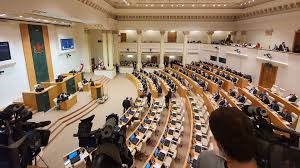Tbilisi's long election eve
Less than a year after the parliamentary vote, the ruling Georgian Dream party has regained support, cashing in on the European Commission's favourable recommendation for EU candidate status. A result that Patriarch Ilya II himself hailed as a 'result of the efforts of our people and the authorities leading the country'.
Tbilisi (AsiaNews) - There is less than a year left until the parliamentary elections in Georgia, and the political climate of the entire country is already becoming incandescent, with the multiplication of polls and promises of alliances, electoral barriers to be modified, as if until now the issue it hadn't been important.
The incessant clashes between the majority and the opposition, the debate on the impeachment of president Salome Zurabišvili and the release of ex-president Mikhail Saakashvili are today giving way to the redefinition of positions, awaiting the judgment of the people.
The main topic of discussions in the last two years has been that of the possible admission of Georgia to the status of candidate for entry into the EU, and last November 8th the favorable recommendation arrived from the European Commission which in some way closed the phase most acute of the issue, opening up all the other fronts of conflict.
In theory, even if the chances are not very high, on December 15th the candidate status could be blocked by individual EU countries, but even this eventuality would not cause particularly agitated reactions among Georgians, it would not in any case be a "total rejection".
According to the latest polls, at the moment the ruling Georgian Dream party would count on 25% of the vote, while the National Movement linked to Saakashvili would stop at 13%, which could increase significantly through agreements with smaller opposition parties.
Alone, the other lists would not reach 5%, a figure that is being discussed due to the electoral barrier. After a decline in the previous months, the Georgian Dream would have therefore once again reached the share recorded at the end of last year.
The political crisis of last March, which risked costing the majority dearly, was generated by the attempt to impose the "Putinian" law on foreign agents, but the defeat on this point was compensated by the search for European alliances, such as the one with Hungary, which while not breaking away from the pro-Russian trend, have somehow shifted the attention of Georgian society.
For their part, the leaders of the National Movement have failed to arouse new waves of consensus among the opposition. As the deputy Roman Gotsiridze, who left the National Movement to join the other group of "Euro-optimists", pointed out, "the populist rhetoric of victory is not enough if it is not supported by the results".
The theoretical superiority of the pro-Western over the pro-Russians, on which Saakashvili's friends insist, has not in fact found comfort in the rounds of local elections over the last year, also due to the inability to constitute a united and credible front for counter the "servants of Ivanišvili", the Putin oligarch and founder of the Georgian Dream, who controls politics from behind the scenes.
Gotsiridze insists that "it is not enough to console ourselves with telephone surveys and cultivate the sedative practice of consolatory self-affirmation, since we cannot tolerate electoral defeat, when in all elections we end up being defeated".
This form of self-hypnosis of the opposition, conditioned by the antics of the ex-president in prison, always one step away from death, but always resurrecting from his own ashes, according to several observers is based on the general discontent with the entire political class, which should somehow turn into a regime change, while ultimately playing into the hands of the ruling caste.
The katholikos of the Georgian Orthodox Church himself, Patriarch Ilja II, welcomed the favorable opinion of the European Commission as "the result of the efforts of our people and the authorities leading the country".
The influence of the Church on the people is assessed by polls as almost plebiscitary, exceeding 90% of the consensus, and the majority of bishops openly supports the Georgian Dream, such as the bishop of Bodbiysk, Iakov (Jakobišvili) who stated on television that " in the current political opposition there are many women and men who have acted against Georgia's candidacy for the EU, as some Europeans, and also some Americans, have told me”.
Meanwhile, Saakašvili continues to ask President Zurabišvili for a pardon, awaiting a miracle that will reunite the opposition, to create the "new Georgia".
04/10/2021 11:39
10/01/2023 10:18
15/07/2021 09:40







.png)










